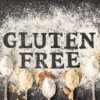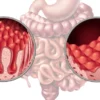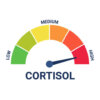
What is IBS?
IBS (irritable bowel syndrome) is described as a functional bowel condition. This refers to the fact that while symptoms are present no clear reason has been identified through conventional testing methods via a Doctor. These testing methods include colonoscopy, stool samples and blood tests.
These tests indicate that no clear cause of symptoms have been identified which leads to IBS being diagnosed and described as a functional issue. This refers to the fact that symptoms are due to an alteration of the function, without a clear cause.
These symptoms of IBS include:
IBS impacted the health of up to 20% of the global population. The symptoms seen in IBS have been indicated to be caused by a range of possible factors.
These causes of IBS can include:
- SIBO (small intestinal bacterial overgrowth)
- Food sensitivities
- Low-grade inflammation
- Stress
- Dysbiosis [Source: PubMed]
While dysbiosis is not a disease, this type of imbalance in the microbial community in the gut can contribute to a change in the balance of the gut microbes that influences the function of the gut. Even though IBS does not shorten lifespan, it does reduce the quality of life.
Many of those with IBS also have non-digestive symptoms. These can include; fatigue, fibromyalgia and stress. All of which have been closely linked to imbalances within the gut microbiome. [Source: PubMed]
What is dysbiosis and gut health?
The gut microbiome describes the microbial ecosystem in the digestive tract. This ecosystem supports many aspects of health including digestive and metabolic health.
When these organisms are in a balanced state, it is described as normobiosis or eubiosis. This is the balance the body is looking to maintain.
However, when these organisms become imbalanced or dysregulated, this is described as dysbiosis. This can be thought of as a disrupted balance in the gut microbiome and the microbial balance in the gut of the patient. This is commonly seen as where potentially pathogenic bacteria take over at the expense of beneficial microbes. [Source: PubMed]
Dysbiosis is associated with a range of health conditions that include:
- IBS (irritable bowel syndrome)
- Crohn’s disease
- Ulcerative colitis
- Obesity
- Type 1 diabetes
- Type 2 diabetes [Source: PubMed]
When dysbiosis is assessed via a stool test, it may be present in 16% of individuals without any health concerns. However, when dysbiosis is assessed in those with IBS or IBD it is present in significant levels.
Studies have found the imbalances in the microbiota (dysbiosis) to be present in 73% of IBS patients and up to 80% of those with IBD. [Source: PubMed]
These studies also assessed the characteristics of dysbiosis in these conditions which can help to approach treatment.
In IBS key organisms found in IBS dysbiosis were:
- Firmicutes (Bacilli)
- Proteobacteria (Shigella/Escherichia)
- Actinobacteria
- Ruminococcus gnavus
While in IBD dysbiosis, the dysbiosis was found in the following bacteria:
- Proteobacteria (Shigella/Escherichia)
- Firmicutes, specifically F. prausnitzii,
- Bacteroidetes (Bacteroides and Prevotella)
Interestingly, the dysbiosis in both of these conditions contained similar imbalances. For example, the proteobacteria group of bacteria were elevated in both IBS and IBD, indicating commonalities between these conditions and dysbiosis. [Source: PubMed]
What are the causes of dysbiosis?
There are many factors that can lead to dysbiosis and the onset of digestive symptoms. 2 of the best understood are the excessive use of antibiotics or after a case of gastroenteritis or food poisoning. These can lead to changes and imbalances in the gut microbiome/microbiota.
Microbiome research indicates that other causes or factors that can contribute to dysbiosis include:
- Diet
- Geographical location
- Surgery
- Smoking
- Depression
- Medication [Source: PubMed]
Dysbiosis and the imbalances commonly seen in this situation may contribute to alterations in the gut that change the pH and level of inflammation.
This means that the environment becomes more beneficial to the organisms that have become imbalanced. This means that once dysbiosis is present, it may not rebalance without support. [Source: PubMed]
Gut Health, Diet and Dysbiosis in the Human Microbiome
Clear dietary patterns and foods have been associated with alterations and dysbiosis in the gut microbiome/microbiota. These patterns can be described in the Western diet which is defined by certain factors.
These are a diet:
- Rich in saturated and unsaturated fats
- High in simple sugars
- Low in fibre
These dietary factors can alter the gut balance leading to dysbiosis but supporting the growth of a less beneficial microbiome. At the same time, this dietary pattern reduces the growth or presence of the microbiome that supports a healthy balance.
High-fat diets have been indicated to promote the levels of certain bacteria which may contribute to inflammation in the bowel. This has been indicated in certain animal studies which found a high-fat diet leads to colitis (bowel inflammation).
A low-fibre diet can also be considered a diet high in refined carbohydrates. In this situation, the diet is low in fermentable fibre which can reduce the food sources from the beneficial gut bacteria. This can be considered as these bacteria being starved.
Not only can this lead to lower levels of these organisms, but also lower levels of the beneficial gut compounds they produce. This can include reduced production of butyric acid, a vital energy source for the gut cells that support anti-inflammatory processes and repair processes along the gut lining. Without this, the gut may be more susceptible to inflammation. [Source: PubMed]
Probiotics for Dysbiosis
Probiotics are defined as beneficial organisms that have a beneficial effect on the host. These have been researched and found to improve dysbiosis as well as a range of IBS symptoms.
Not only can probiotics displace less beneficial bacteria within the gut, but they can also activate and promote the body’s own process to support a balanced microbiome to reduce dysbiosis. This includes stimulating the anti-inflammatory process as well as the production of anti-microbial compounds, used to reduce the levels of less beneficial bacteria in the gut. [Source: PubMed]
Other benefits of probiotic supplements include:
- Supporting the immune response within the gut
- Balancing the inflammatory response
- Reducing food intolerances
- Supporting the digestive process
- Supporting the pH balance of the gut
- Competing with less beneficial organisms with adhesions sites and nutrition within the gut. [Source: PubMed]
One medically reviewed product, VSL#3 contains a combination of probiotic bacteria strains. This combination of probiotic bacteria has been found to support the presence of beneficial bacteria in the gut and lead to a return to balance from a state of dysbiosis.
This probiotic has been found to be particularly helpful in inflammatory bowel conditions such as ulcerative colitis due to its ability to reduce inflammation in the gut. [Source: PubMed]
Additionally, single strains of probiotic bacteria such as Lactobacillus rhamnosus GG have been found to have similar benefits.
This single strain has been found:
- To improve the integrity of the gut lining (reduce leaky gut/intestinal permeability)
- Reduce gut inflammation.
- Support the growth of key beneficial species within the human microbiome [Source: PubMed]
Additionally, this probiotic has been researched extensively for its benefits in reducing symptoms of IBS. These improvements seen in IBS can be due to the actions listed above. This can be understood to be addressing the underlying issues in the gut which can include dysbiosis. [Source: PubMed]
Prebiotics for Dysbiosis
Dietary fibre is well known to help with digestive health and gut function. This can support bowel motility, help with bowel movements and also support metabolic health.
The interest in gut health has led to a better understanding of the role of soluble fibres and their role in gut health. These types of fibres can be found in foods or supplements and encourage the growth of beneficial bacteria, leading to health benefits. These include prebiotics such as inulin and FOS (fructose-rich oligosaccharides).
Prebiotics have been found to reduce the complications found in those consuming a high-fat diet. Additionally, prebiotics have also been indicated to improve the health of those with metabolic conditions such as obesity and insulin resistance.
A primary mechanism through which prebiotics lead to benefits is the production of short-chain fatty acids (SCFAs) such as butyric acid.
These can lead to benefits in the gut that include:
- Strengthening the gut lining
- Improvement of hormones related to fullness (satiety)
- Improvement of the gut microbial balance
- Production of anti-microbial compounds
The finding also found that a diet rich in prebiotics leads to an increased level of key bacteria that support the gut microbiome and the microbial balance in the gut of the patient. This indicated an improved balance of the gut and improved/removes dysbiosis.
The bacteria supported by prebiotics were: Akkermansia, Bifidobacterium, Sutterella and Turicibacter.
The different types of dysbiosis?
The general understanding of dysbiosis in the microbial community is where potentially pathogenic (or bad) microbes increase within the gut. This is at the expense of the beneficial microbes. This imbalance in the gut microbiota is called dysbiosis.
This is not a single condition, but it can be classified further into types of dysbiosis. These types or forms of dysbiosis can indicate which type of imbalance is present.
Deficiency dysbiosis:
Deficiency dysbiosis is where there is a reduction in the beneficial bacteria which include Lactobacillus and Bifidobacteria.
This can be the result of:
- A low-fibre, Western-style diet
- Antibiotic therapies
Deficiency dysbiosis is associated with insufficiencies in digestive enzyme production and food intolerances. [Source: PubMed]
Putrefactive dysbiosis:
Putrefactive dysbiosis is described as the result of an increase in certain bacterial species in the microbiome that produce putrefactive factors. These can impact the health of the gut mainly from the bacterial group, Bacteroides.
This can be the result of a diet high in fat and meat yet low in fermentable gut-friendly fibres. This can lead to the production of putrefactive products such as ammonia, amines, and phenols which can contribute to digestive symptoms (eg symptoms of IBS, bloating, distention, and abdominal pain). [Source: PubMed]
Fermentative dysbiosis is perhaps most likely to be a factor or cause of IBS symptoms. This can be where dysbiosis in the small or large intestine can lead to an intolerance to fermentable fibres. Due to dysbiosis in the host microbiota community, the ingestion of these fibres, found in many foods such as garlic, beans and wheat, may lead to increased gas production and gut health symptoms.
This may then contribute to the symptoms of IBS that include bloating, pain, distention and altered bowel patterns. [Source: PubMed]
Susceptibility dysbiosis:
Susceptibility dysbiosis is characterised by alterations to the gut microbiome that include:
- A reduced amount of beneficial bacteria
- An increase in potentially pathogenic (bad) bacteria
- Altered bowel motility (eg constipation or diarrhoea)
- Inflammation in the gut.
These are common factors in digestive disorders such as IBS (irritable bowel syndrome) and IBD (inflammatory bowel disease).
Fungal dysbiosis:
Fungal dysbiosis is considered an overgrowth of fungal species such as Candida within the gut microbiota.
This can lead to alterations in bowel function and be promoted with the intake of sugars and highly refined carbohydrates. [Source: PubMed]
Gut Dysbiosis Diet
As discussed previously in this article, a Western diet is a factor that can encourage gut dysbiosis and imbalances in the human microbiome. This is due to high fat and carbohydrate intake contributing to alterations in the gut microbiome and microbial community. Either directly or indirectly altering the microbial balance.
This can simultaneously involve the stimulation of less beneficial organisms while also not providing adequate fibre to support the growth of the beneficial gut bacteria.
Therefore, to support the gut microbiota a diet rich in plant fibres can encourage a stable and diverse microbial ecosystem and combat dysbiosis. The nondigestible fibres present in plant foods (fruits, vegetables and grains) support the fermentation process and the beneficial by-products such as SCFAs (e.g. butyric acid).
A diverse and nutrient-rich diet will also support the levels of key micronutrients required for gut health. These include zinc, vitamin D, vitamin A and folate. [Source: PubMed]
Part of the process to address dysbiosis is to encourage certain dietary patterns, however, when the gut is sensitive it may have a reduced tolerance to certain fibres. This is where working to support the gut with supplements targeted at the root issue can improve the underlying factors and then allow these foods to be introduced. In the meantime, to manage symptoms elimination or restrictive diets can be considered. This includes the low FODMAP diet. [Source: PubMed]
A low FODMAP diet has been well-studied to reduce symptoms in those with functional digestive conditions such as IBS. However, this low-fibre approach is a short-term strategy to reduce symptoms and identify triggers. In the long term, this may lead to alterations and insufficiencies in the gut microbiome. [Source: PubMed]
Is dysbiosis the same as IBS or a gut disease?
Dysbiosis is not the same as IBS but dysbiosis can contribute to the symptoms of IBS. When considering the underlying factors of IBS imbalances can lead to dysregulation in the gut microbiota which then contributes to the symptoms of bloating and abdominal pain.
However, dysbiosis in the gut can be present without digestive symptoms. This means that gut dysbiosis does not automatically lead to IBS. This is reinforced by the fact that dysbiosis in the gut microbiota is common in other health conditions that do not involve digestive symptoms of IBS. These health conditions can include obesity, diabetes and depression. [Source: PubMed]
The causes of dysbiosis in IBS can be related to a range of factors that include diet, the use of medications, stress and events of food poisoning or gastroenteritis. [Source: PubMed]






